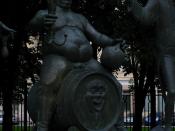Alcoholism: A Disease or an Addiction?
Most people have a confused idea of alcoholism as a disease that invades or attacks your health. Use of such a strong word such as "disease" shapes the values and attitudes of society towards alcoholics. A major implication of the disease concept is what is labeled a "disease" is held to be justifiable because it is involuntary. This is not so because problem drinking is a habit in which the so-called "alcoholic" simply has decided that the benefits of drinking outweigh the liabilities. This is a matter of personal choice. An alcoholic participates in or causes many of their own problems by their behavior and the decisions they make. Why should they be viewed as helpless victims of a "disease" (Skipper 1)? Alcoholism should not be viewed as a disease, but as an addiction brought about by the alcoholic's personal choices.
What is wrong with disease theories as science is that they are tautologies; they avoid the work of understanding why people drink.
People seek specific, essential human experiences from their addictive involvement. People can come to depend on such an involvement for these experiences until the involvement is totally consuming and potentially destructive (Peele, Herbert 37). The idea that alcoholism is a "disease", which only typified by the loss of control, was only sanctioned by the American Medical Association in 1956 (Wilbanks 39). The AMA gives the following definition of alcoholism: "Alcoholism is an illness characterized by preoccupation with alcohol and loss of control over its consumption, such as to lead usually to intoxication if drinking; by chronicity, by progression and by a tendency toward relapse. It is typically associated with physical disability and impaired emotional, occupational and/or social adjustments as a direct consequence of persistent excessive use (Langone 27)." This meant that...



Disease or Addiction?
You have written a very good essay on a malady which has destroyed many lives. After reading your report, I am more inclined to view alcoholism as an addiction rather than a disease, although that may not be politically correct (as if we should all be in absolute dread of ever appearing not politically correct). Whether alcoholism is a disease or an addiction, I think we can all agree that it is vitally necessary to seek out help as soon as possible. Your report was well researched and documented. The internal citations nicely complement the extensive bibliography which you have provided and will be of help to those who wish to do more research on alcoholism. Well done!
11 out of 12 people found this comment useful.